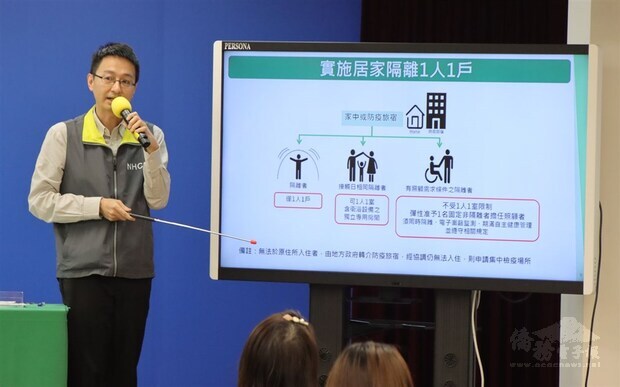
Taipei, Feb. 27 (CNA) The "one person per residence" rule currently applicable to all arrivals in Taiwan since mid-January will be expanded to include those who need to undergo self isolation after having contact with individuals found to have COVID-19, starting March 1, the Central Epidemic Command Center (CECC) announced Saturday.
The expansion of the quarantine rule was decided based on the growing number of coronavirus variants, which are more transmissible in households, and after a review of the recent cluster infections at Taoyuan General Hospital, Minister of Health and Welfare Chen Shih-chung said during a CECC press briefing.
The review of the cluster infections that led to 21 COVID-19 cases, including one death, found that 14 cases were infected with a coronavirus variant that shares the same mutations as a coronavirus strain identified as CAL.20C. This variant was detailed in a research letter published through the American Medical Association on Feb. 11, according to Lo Yi-chun, deputy chief of the CECC's medical response division.
Citing research conducted by the University of California, San Francisco, Lo said patients infected with CAL.20C are 13 percent more likely to develop serious illness and 11 percent more likely to die, while the strain is 35 percent more easily transmitted in households.
The cluster infections were first confirmed on Jan. 12, with two domestically transmitted cases -- a doctor treating a COVID-19 patient who showed symptoms after returning from a trip to the United States, and the doctor's live-in partner, a nurse who also works at the hospital.
Among the 21 cases in the cluster, 10 were classified as infected in hospitals, while 11 were classified as contracting the virus in households.
Currently, people required to undergo quarantine after being identified as having close contact with someone who contracts COVID-19 can do so at their home and still live with their family.
From March 1, if a person ordered to undergo quarantine shares their home with other people, the individual will be required to book a room at one of the government-designated quarantine hotels or in a quarantine facility set up by the authorities and stay there, the CECC said.
If people who share a residence are all required to undergo quarantine, they can do so at home if each one has their own living quarters and their own washrooms to avoid contact with each other, the CECC added.
An exception to the rule is made if the people required to enter quarantine are minors, people aged 65 and above, those with mental or physical disabilities, or people suffering from serious injuries or illness, who need a carer; or if they are a carer to others in the aforementioned situations, according to the CECC.
In these situations, one co-habitant is allowed to enter quarantine as a carer or the one being cared for. This individual will be required to follow the same quarantine rules, and then a seven-day self health management period, during which people are required to avoid going out and attending gatherings and have to wear a face mask if they do go outside, the CECC added.
On Saturday, Taiwan reported three new imported COVID-19 cases, bringing the total number to 954 since the pandemic began. Of the total, 917 people have recovered, nine have died and 28 remain in hospital, CECC data showed.